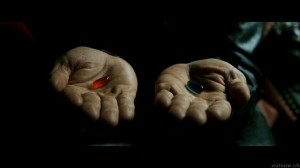This is the first part in my series for Pagan Values Blogging Month.
 Back in college, I took philosophy classes. Of course, one of the things we talked about is the idea that you can’t really know that anything exists, because our senses can be deceived. I could be a brain in a vat being fed information by an evil scientist, and there’s no real way to know! It’s the philosophical construct that brought us “The Matrix,” and just about everyone’s run across it.
Back in college, I took philosophy classes. Of course, one of the things we talked about is the idea that you can’t really know that anything exists, because our senses can be deceived. I could be a brain in a vat being fed information by an evil scientist, and there’s no real way to know! It’s the philosophical construct that brought us “The Matrix,” and just about everyone’s run across it.
But here’s the thing: so what? Yeah, ok, it’s a mindfuck to think about that, but does it help me live my daily life?
Well, it tells me that just because I think I see something doesn’t mean it’s real. We’ve all heard about the unreliability of eyewitness testimony, so that’s not exactly news. But beyond that, there’s no real point to doubting my perceptions too much because they’re all I have. Sure, I could be a brain in a vat, but I strongly suspect that stepping out in front of a car will still suck a whole lot. I could be a brain in a vat, but if I put bread in a toaster and toast it just right, and eat it, it’s still tasty.
Until Lawrence Fishbourne shows up to offer me two pills, it behooves me to act like this world is real. I don’t have to know why a toaster works in order to put bread in and get toast. I don’t have to know why going through a particular set of actions is generally followed by me finding a good job to use those actions when I’m out of work. The fact that those actions include lighting a candle and tossing coins in a fountain as well as polishing my resume and researching employers before I send it to them is irrelevant. It works.
I approach the gods the same way. When I do X, Y is the result is what matters to me. When I attend (or perform) a ritual dedicated to a deity, I have particular deity-related experiences. Those experiences enrich my life and help me solve problems. That is what matters to me, not the Grand Underlying Truth(tm). I don’t care whether “all gods are one god!” or “all gods are indivuduals!” or “all gods are delusions in my brain!” It’d be interesting to know, but since I can’t know, it’s irrelevant. What I care about is what I experience.
When I do magic, I get results. Is it because I’m priming myself psychologically to be alert for opportunities? Is it because I’m sending energy into the world that makes things happen? That is irrelevant. Sure, it’s interesting, but given our current state of technology, it’s unknowable.
If you ask me whether I believe in the gods I worship, you might as well ask me whether I believe in rocks, or in postal workers. I don’t believe. I know what I’ve experienced.
That is what I mean by “experiential pragmatism.”
Victor Anderson, founder of the Feri Tradition and one of the teachers of my teacher Thorn Coyle, used to say “first perceive, then believe.” That’s what I’m talking about. If you believe first, your perceptions can get warped. I try to set aside my expectations before ritual and just pay attention to what happens.
I place a far higher value on knowledge gained from personal experience than on knowledge gained from books — and if you know how much I love books, you know how much I value experience. My favorite Tarot card is the Hanged Man — the one who learns through action and suffering.
I learn by doing. I meet my gods by doing. I value the concrete over the abstract. Yes, I love intellectual and theoretical discussion, but where the rubber meets the road is what’s important. Talking about politics is interesting, but giving money and time to causes is what matters. Voting is what matters. I love talking about the gods, but actually having a devotional practice is what matters.
There was an email forward going around years ago that I loved, which described all the different majors in college.
The line for Philosophy was: “the class where you decide the universe does not exist, and then break for lunch.”
I care about lunch.





Pingback: Pagan Values Blogging Month: It Begins! | Ego! Ego! Ego!